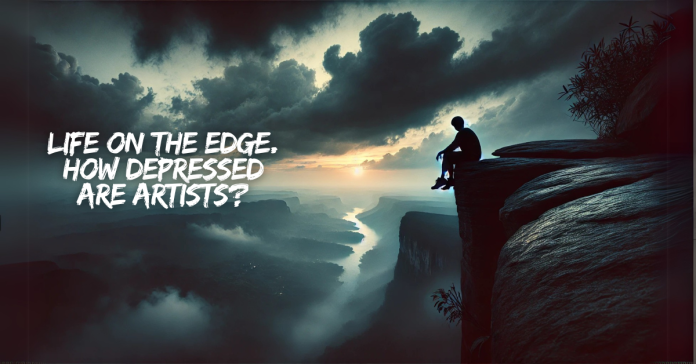Life on the Edge, dangling my feet. How Depressed Are Artists? Are they all depressed? Does depression, dark moods make the best art?
the money to art, instead of to all shops, expensive brands and therapists.
Well, the concept of the ‘starving artist’ of course has been around for many a year, but fighting for their mental health? It is interesting to learn that while van Gogh was severing his ear, there could have been something more to it that many artists are susceptible to – the artist’s dark side.
Well, welcome to the arbit foul where the creativity and the mental health of human beings intersect. The art-thinking: comparative suicidal tendencies of artists and accountants Is there any feeling such as gazing at the blank canvas and contemplating one’s own state of existence? Let’s find out.
The Tortured Artist: Myth or Reality?
We’ve all heard the stories. Kurt Cobain, Sylvia Plath, Ernest Hemingway are the authors who worked on their masterpieces and suffered from their internal conflicts. Still, apparently it all adds to the notion of the ‘tortured artist’ – but is this a myth, or is there some truth in it?
Research suggests there might be. A study conducted by the Office for National Statistics in 2015 showed that employees who worked in arts were up to four times more likely to commit suicide than other citizens. An article from the Karolinska Institute also indicated that the same people in creative careers had a 8% chance of suffering from bipolar disorder.
But in a last moment of hope before everyone paints their brushes and sets them on fire … let’s realize that correlation does not mean causation. Is art depressing or do people who suffer from depressio have a tendency to become artists? It is the causality conundrum of life – only there is no chicken and egg but more of black turtleneck wearing and anxiety about meaning of life.
The Brain on Art: Why Creativity Might Come with a Side of Sadness
Here’s where things get interesting. That is the same brain wiring that enables certain individuals to be very creative, might also lead to such individuals being more sensitive to stress.
Research actually shows that creativity and latent inhibition are inversely related; that is, creative individuals are less capable of not paying attention to stimuli that most individuals would not focus on. On the one hand, this allows them to connect the dots in a different ways and to perceive the world in different manners (and we all know creativity goes hand in hand with this kind of thinking); on the other hand, this makes them receive and process more information and emotions. That’s exhausting.
Start with Billie Eilish, who shares she has dealt with depression, at the same time releasing music for millions of fans. For instance, painter Edvard Munch said, “Illness insanity and death were the black angels that watched about my crib and me all my life’s journey.” Not organizations, which gave us quite cold and shiver childhood memories, but they gave us The Scream.
Financial Insecurity: When “Exposure” Doesn’t Pay the Bills
We can be quite frank, an almighty influential factor that fuels artists’ psychological disorders is not the spirit of boo-hoo ‘starving artist’. It is quite a paradox to think that society has developed a culture where artists are supposed to be paid ‘exposure’ alongside the bills.
It involves daily grind, freelance and just in time employment, and the mental anxory of wondering whether your next cheque will arrive before the electricity is cut off. According to the survey conducted in 2019, 63% of artists stated the income they earned from art was below minimum wage if calculated on an hourly basis.
It is great if Lady Gaga is okay but for every celebrity today, there are thousands of talented musicians, comedians, dancers, singers, actors and artists struggling to pay bills through additional jobs. Prominant successful artists such as Florence Welch from the Florenc +The Machine band have mentioned that the disease always haunt them due to the nature of the artistic careers that mainly rise to fame only to fail hopelessly.
Social Media: The Double-Edged Paintbrush
The use of technological media has had more impact on the social artists than any other thing in the contemporary era. On one hand, social media such as Instagram and TikTok provide the opportunity to rapidly gain popularity and the audience does not filter the artist. On the other hand, they have developed an idea that can be compared to a comparison machine that is always active.
Every time Adam J. Kurtz shares on Twitter about his anxiety and depression, many thousands of people respond. While there are those for whom creative communities open new opportunities of collaboration, there are many who spend hours mindlessly browsing meticulously designed and selected feeds, comparing their spontaneous approaches to creativity to carefully crafted shots of well-organized and determined work.
It’s the obligation to work, to generate content, to create and build this “brand” as well as, you know, create art – it’s enough to make one wannabe a performance artist, a la Banksy.
The Upside: When Depression Fuels Creativity
Well, do not get me wrong, there can be some positives to this otherwise ‘gray’ drawing. Several artists claim that they have a common issue with mental health, and its influence on their art is significant.
Starting from her song ‘Rolling in the Deep,‘ Adele transform Hope from her previous record company into Grammy-winning albums. It is crucial to understand that Kahlo was powerfully rebelling against the conventional representation of female pain, which plays an important role in her paintings. Logic released a song named ‘1-800-273-8255’ which is actually the number of the suicide prevention hotline and this too had a very positive impact on fans who were going through such thoughts.
Art is a form of expressing and making something good out of the adverse experiences one undergoes. It is easy to understand why some of the powerful pieces of art can emerge from very sensitive areas – heart – as they reflect the feelings of people.
Finding Balance: Mental Health in the Creative Community
The good news? There is already a growing discourse specifically for artists about mental health. For example, The Artist’s Health Alliance and Backline are organizations that are dedicated to addressing mental health issues of creative industry professionals.
Speaking for themselves, artists are a driving force. It is common knowledge that hip-hop star Scott Ramonегест; the Kid Cudi, recently admitted himself into a rehabilitation center due to depression, and desire to commit suicide. “I did suffer from clinical depression and that is the inspiration behind writing my book called “Reasons To Stay Alive.” These conversations demystify and depict that attending to one’s mental health does not mean the absence of creating great art.
So, How Depressed Are Artists, Really?
If it comes to truth, possibly people are dishonesty more compared to accountants but not as dishonesty as we seem. The fact is that artists have several issues: lack of stability, negative audience feedback, loneliness in creativity, and many of them have a different brain with a high level of empathy.
But they also possess vast opportunities for communication, support groups who know their hardships and, first of all, the feeling of accomplishment when creating something useful.
What can be helpful isn’t more “tortured artists” who produce their works at the cost of their health. We require stable environments for creative persons, life support for artists, and society appreciating art enough to pay its creators.
Because after all, even if art is all that this world requires, the world must also have healthy artists to produce it. And no masterpiece is worth the creator’s peace of mind – no matter what they made that Vincent van Gogh bio-pic into.
So, to all the creative souls, spirits, hearts out there – do not stop creating wonderful strange marvelous pieces of art. But maybe also consider therapy. Just saying.

